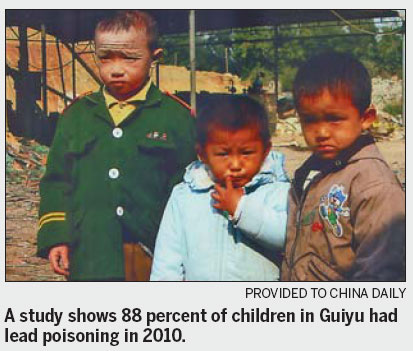Lead levels in children linked to rise in e-waste profits
Updated: 2011-11-16 07:59
(China Daily)
|
|||||||||

Huo Xia says parents suspected she was trying to sell their children's blood or do government research that would shut down their illegal e-waste processing businesses.
So it took a lot of explaining for the Shantou University medical college cytological analysis professor to convince parents in Guangdong province's Guiyu town to let their children's blood lead levels (BLLs) be tested.
The results showed 88 percent of the 167 children - all younger than 6 - tested had lead poisoning in 2010.
That's a surge compared to the 16 percent rate among the 227 children tested in 2009. She can't fully explain the jump.
But the researcher suspects the decrease to 16 percent from 81.8 percent in 2004 was due to the global recession, lowered copper prices and the consequent decrease in e-waste processing.
Huo has analyzed the BLLs of about 1,000 children in the under-6 age group in Guiyu since 2004.
Her first tests of 226 children that year found BLLs of at least 13 micrograms of lead per deciliter of blood.
The World Health Organization calls 10 micrograms, "cause for serious concern", and adds, "There is no safe level".
Huo says one 5-year-old boy with a BLL of 15 micrograms appeared pale and had a wrinkled face.
"His parents said his deformity began at age 2, and the local hospital couldn't do anything about it," she says.
Most of the children with high BLLs also have attention deficit and behavioral problems, Huo says.
The main reason for high BLLs among Guiyu's children is e-waste's lead dust, which floats in invisible clouds about a meter above the ground - that is, around the same height as children's noses and mouths.
"Also, parents who are exposed to lead in the workplace can pass it on to children through the dust on their clothes," Huo says.
Most of Guiyu's parents encounter the heavy metal daily at their e-waste processing jobs.
So, Huo and her assistants traveled door-to-door to explain the dangers of lead poisoning and her research's value in 2005.
She also persuaded local kindergartens to organize blood draws.
"The parents can't do anything about the diseases they have. So, I asked them, 'Do you earn your living at the risk of your children's lives?'" she recalls.
It worked. The families agreed to allow their children to be tested.
"The pollution problems and their health implications will depend on the market," Huo says.
"When the e-waste products' prices rise, so too will the health costs."











